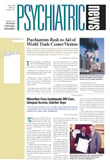Immediately after the terrorist attacks on the World Trade Center and Pentagon on September 11, APA staff began to mobilize in an effort to share its members’ expertise with the public and the press to help them understand the emotional and psychiatric consequences that people who live through traumatic events often endure.
Despite being just across the river from the Pentagon and only four blocks from the White House, and not knowing whether the attacks were in fact over, a substantial number of APA staff remained in the headquarters building to respond to phone calls hours after the building owners closed the building at about noon that day.
APA Medical Director Steven Mirin, M.D., quickly sent a set of “talking points” to all member list serves to help them prepare for media inquiries. These points included recommendations for individuals on what they should do when disaster strikes, suggestions for talking with children about the traumatic events, and the psychological problems that trauma survivors and witnesses often experience.
The APA information also described treatment interventions that can help people process and deal with the sequelae of a disaster and emphasizes that these consequences “are not limited to individuals directly in the traumatic event.” This “secondary traumatization,” APA points out, can impact such at-risk groups as family members, police, firefighters, and health care professionals who respond to the disaster.
This information, in language geared to a nonprofessional audience, was also added—along with other helpful information about responding to traumas and disasters—to the APA Web site at www.psych.org under the new heading “When Disaster Strikes. . . .” One section provided guidance on how to help children process the events of September 11, emphasizing how important it is to “listen to children, accept their fears, and talk with them.” It offered the following advice:
• Reassure your child that he or she is safe from harm and is being protected.
• Reassure the child that the state and federal government, police, and doctors and hospitals are doing everything possible to help the people hurt by this tragedy.
• Listen to your child’s fears and concerns and encourage him or her to talk to you and other family members about fears and anxieties related to the traumatic events.
• Let your child know that in time the United States will recover from this disaster.
• If you are frightened, tell that to your child—don’t minimize the danger, but also talk about your ability to cope with your own fear and anxieties and to continue with your life.
That same day the staff of APA’s Division of Communications and Marketing issued a press release to more than 2,500 members of the press that provided much of the same information available on the Web site and in Mirin’s message to the member list serves about coping with trauma and getting help for the psychological consequences.
Within one week of the attacks, that office had fielded about 160 calls from large and small media outlets asking for information about the mental health consequences of trauma, how these problems are treated, and the names of members who are expert in this area of psychiatry. Media inquiries came from the country’s leading newspapers, including the Washington Post, New York Times, USA Today, and Boston Globe, as well as a few smaller ones. Cable news channels such as CNN also contacted APA as did ABC’s “Good Morning America” and several local television stations. Interest in contacting APA was not limited to U.S. media outlets. The communications division also heard from the Paris-based newspaper Le Figaro and from a paper in Greece. The BBC in London also asked APA for information on the mental health aspects of disasters.
On September 13 APA President Richard Harding, M.D., issued a statement that offered advice and reassurance. He urged people to acknowledge their fear and anger and to discuss their emotions with others. He also suggested that participation in community activities such as remembrance ceremonies can be an important step on the road to healing, as can contributing time, money, or other assistance to those on whose lives the disaster had a direct impact. Harding urged people to draw as much strength as possible from their spiritual or religious beliefs and to resume their normal routines as quickly as possible.
“Understand that strong feelings of grief can resurface sporadically even months after the events,” Harding noted, “and that such feelings are normal.” He advised people to consult a physician or mental health professional “if feelings of grief and loss or fears stemming from the traumatic events become chronic or impair your daily activities and relationships.”
Within days of last month’s tragic events, APA approved grants of $10,000 each to the New York County, Washington, D.C., and Pennsylvania district branches as part of its Erich Lindemann Disaster Grant Program.
APA district branches that want to organize a response to traumatic events such as those of September 11 can apply for a grant through the program, which is named for a Boston psychiatrist, who beginning in the 1940s, contributed considerably to knowledge about disaster psychiatry and coping with grief. Established in 1998, the grant program makes up to $10,000 available to a district branch each year to respond to a disaster occurring in its area. A total of $30,000 is available annually for the program. Grant requests are set in motion when a district branch president forwards a written request to the APA medical director, who consults with the APA president, Assembly speaker, and chair of the Committee on Psychiatric Dimensions of Disasters.
The grants are for funding a mental health response to a disaster and are to pay for such components as educational materials, photocopying, training, consultations, conference calls, transportation, and so on. Funds are not to be used to pay psychiatrists or others for providing psychotherapy, counseling, or other direct patient-care services. ▪
